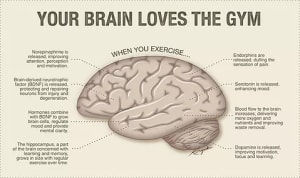


I hope none of my students will ever have to use the self-defense skills I’ve taught them to fend off a gunman or a knife wielding attacker. The reality is that with common sense, avoidance of danger and using de-escalation tactics, a violent encounter can be less of a risk to the average person. However, there are threats that eventually most of us will have to face no matter where we live or what our occupation is: eventually we will be forced to defend ourselves against the prospects of declining health and the effects of growing older. These prospects are often made worse by our busy and demanding lives, which can result in a lack of exercise, eating unhealthily and a reliance on less-than-healthy vices such as binge eating or drinking to name a few. Exercise and fitness play a vital role in keeping your body healthy and fit, which in the long run is likely to be one of the best ways to defend yourself, FROM yourself. If self-defense is about getting home safely to your family and ultimately protecting life and well-being, then given the inevitabilities of life and human nature, fitness is the best defense we ALL have for protecting our overall health. Protecting our health and combating our excuses for avoiding healthy choices allows us the time to enjoy our families, achieve our dreams, and preserve our hopes and aspirations and can keep us safe form our human tendencies, for excuses and complacency. Are you safe form your excuses? Are you safe form…yourself?
According to the Centers for Disease Control, the average adult should strive for 150 minutes of moderate aerobic activity and at least two muscle strengthening workouts or activities per week. We all know exercising is good for us, but it is also one of the easiest things to procrastinate. Today’s on-the-go lifestyles of fast food and immediate gratification make this easy to do and are leading to a rise in obesity, heart disease, and diabetes. In fact, according to the NIH, approximately 66% of American adults and 33% of American children and adolescents are facing obesity or the affects from being overweight. This epidemic necessitates, now more than ever, the defense FROM ourselves through fitness.
I could go on listing the many reasons that leading a healthy lifestyle with fitness as a key component is important, but I think we all can agree (without the dismal statistics) that fitness and a healthy life style is indeed paramount. Rather, let’s address a few of the common excuses and tactics we use against ourselves to sabotage our well-being and discuss how to combat these in our defense FROM ourselves.
The Problem: Procrastination at its core is simply avoidant behavior. When we find ourselves thinking, “I’ll start working out tomorrow,” or “I’ll start my diet after I eat this last treat,” we are exemplifying the behaviors of procrastination. Why do we do this? Usually, people procrastinate when they don’t know where to start or view a task as difficult or are unsure what the outcome will be. This mindset holds especially true for fitness because viewing the changes needed to start a fitness regimen typically seem daunting. Getting into shape and working out is not always easy; it will be difficult at times, but the more you do it, the easier and more rewarding it becomes because your ability increases. As for the not knowing what the outcome will be: we do know! Science tells us quite simply that exercising and living a healthy lifestyle is best for us: We will release ‘feel good’ endorphins, sleep better, and lower our risk for disease. Ironically, when we do these things our fitness regimen becomes easier, we know what to expect, and it becomes harder to put off because we know the outcome of our workout will indeed leave us feeling happier and healthier.
The Fix: The first step to overcoming this is to commit to a schedule. When we haven’t fully decided on the “how” of executing a goal, it becomes easier to procrastinate. Decide on a schedule, pick a time, and commit to it. Do not schedule anything else for that time.
Second: Prepare. Lay out your clothes or running shoes to make it as easy as possible to follow through on your goal. The simple act of preparation also helps to solidify your decision to work out and can serve as an encouragement.
Finally: Write down your goals and put them somewhere you will see. Perhaps consider sharing your goals with someone who can encourage and motivate you during those times when you will inevitably need some extra encouragement. It’s easier to procrastinate vague goals, but when you create specific, and measurable goals, it is much easier to maintain your motivation once you start. Just remember goals can and should adapt over time. (When working with students we prefer to use SMART goals which are, Specific, Measurable, Achievable, Results-Focused and Time bound.
The Problem: The great American Basketball Player, John Wooden, said that “If you lose self-control everything will fail”. This may seem extreme, but it holds true for most areas of life. If we don’t control our (re)actions, moods, tempers, and disposition this can, and will, have a ripple effect on jobs, relationships, attitudes and various other areas, causing the balance of our life to indeed feel out of control. We must learn to act rather than react. When that craving for a diet soda or sugary treat hits, do you respond to the desire and acquiesce control only to be controlled by your craving? When your body says “I’m sore from the last workout” do you react and sit back down on the couch, only to procrastinate your next workout because it seems hard? Or, do you push past, harness YOUR self-control and CHOOSE to ACT?
The Fix: First, recognizing that these self-sabotaging behaviors tend to happen when we feel stressed or overwhelmed is critical. Before you react to impulses ask yourself what it is exactly with which you feel overwhelmed or stressed. Choose to find an alternative or compromise that allows you to remain in control but alleviates your stress. Perhaps you make a conscious choice only to eat ONE square of the chocolate bar you were longing for, and save the rest for another time you may feel overwhelmed with a craving; maybe, you avoid the diet soda and get your caffeine fix with coffee or tea, but you avoid the extra cream and sugar. You always have a choice. Do not be a slave to your impulses, or everything will indeed fail. Remember, baby steps count! Even small forward progress is progress, and progress is proof of self-control.
The Problem: Our egos are a fragile thing, sometimes giving us just the dose of tenacity we need, but often our ego works against us. Do not confuse your ego with confidence. Where ego does not want to be embarrassed or called out, confidence says, "Even if I fail, it's OK because I tried." Confidence is OK with trying again, but the ego does not want to be put in a position where we will make ourselves look anything less than stellar. You may procrastinate beginning a fitness regimen for fear of looking silly or for fear of not looking like you know what you're doing in the gym. This is your ego talking! Thoughts of, “Everyone will know I’m new, or that I have never done this” will creep in. For some, the idea of being watched or judged by their body or ability can be paralyzing. Our ego wants to protect us and tells us not to make ourselves vulnerable because we don’t know what will happen (back to those reasons for procrastination). Extinguishing our ego is a crucial step.
The Fix: The best thing you can do for yourself when your ego allows fears to creep in is to acknowledge it. Own those feelings and allow yourself to sit with them. Perhaps you may want to write down what exactly it is you're afraid of. Sometimes the simple act of penning out our fears and giving words to feelings can help us realize how inconsequential they are in comparison to other bigger things in life. Reach out to a friend or family member who is familiar with your goals and can encourage you to set your ego and fears aside. Just remember the one person you can always make available to give a pep talk is YOU! Positive self-talk really works. Quiet your ego with the calming word of “I can do this” or, "This isn’t always easy but you’ve powered through before and you are beginning to meet your goals. You've got this!” It may sound silly or childish, but you can be your own worst enemy or your biggest fan so put that confidence to work, and tell your ego to take a hike!
At Krav Oz, our motto “Your Strength. Your Fight” is more than words on a shirt or something we reference for marketing. This mindset is what we believe in and strive for every day. We believe strength comes from beginning new endeavors, shattering goals, seeing results, and understanding that you have more strength in yourself than you ever realized. Whether you’re fighting to get that promotion at work, battling to put vices aside or just need to find more time for you, we look to help our students uncover that strength. We truly believe that your comfort zone grows in proportion to how far you step out of it. Anytime you strive to make a change in your life it will naturally stir up internal resistance because you are attempting to move beyond the familiar. In order to stay in your comfort zone you may procrastinate, you may give in to your vices and sabotage your growth, or you may let your ego or fear barricade you progress. Being aware of these pitfalls and road blocks will allow you to combat the confines of your comfort zone and the ‘safety’ you perceive there. It is only through the challenging of these internal roadblocks that we actually become safer. This is where we defend our health, our well-being and protect our hopes and aspirations. This is how we defend FROM ourselves.
Chantell is a Certified Personal Trainer and Behavior Change Specialist through the National Academy of Sports Medicine, as well as a certified suspension trainer, and Krav Maga/Defensive Options Fit To Fight Instructor. Chantell enjoys training across various specialties as an athlete and student for 20 plus years and has spent the last decade immersed in the health and fitness industry in her pursuit to bring the benefits of exercise and fitness to others.

Last month, I was only going to sign up my 12 year old son but decided to sign up after taking an introductory class. Every class is different and I am learning something new each time. Chantell and Ehren are awesome trainers that push us to do our best. I would definitely recommend Krav Oz LLC to my family and friends!

I took a Women's Self Defense class with Chantell in July and instantly felt a need to continue. A few days later I signed a 12 month contract. I can't believe how far I've come since day one. Chantell and Ehren are amazing instructors. They are so passionate about what they do. Every class is better than the last. I’m constantly talking about my training with my friends and family. I would highly recommend Krav Oz LLC. I don’t know how they do it but I leave every class with a huge smile on my face. Thank you, Chantell and Ehren!

I recently attended Krav Oz's Self Defense seminar in Rockville - and it was fantastic! A comprehensive four hours covering everything I could want, and at just the right speed to keep me and the other attendees challenged and engaged. From start to finish, Chantell and Ehren provided excellent instruction; without sacrificing the skill and passion they possess for their field, Chantell and Ehren created an encouraging and stimulating environment fueled by real life, practical examples in the lecture portion, and helpful analogies to make the defense moves in the self-defense portion hit home (pun intended). In short, this seminar was one from which all could benefit - whether you've never heard of Krav Maga, or have spent years on the mats. Can't wait to come check out a class!